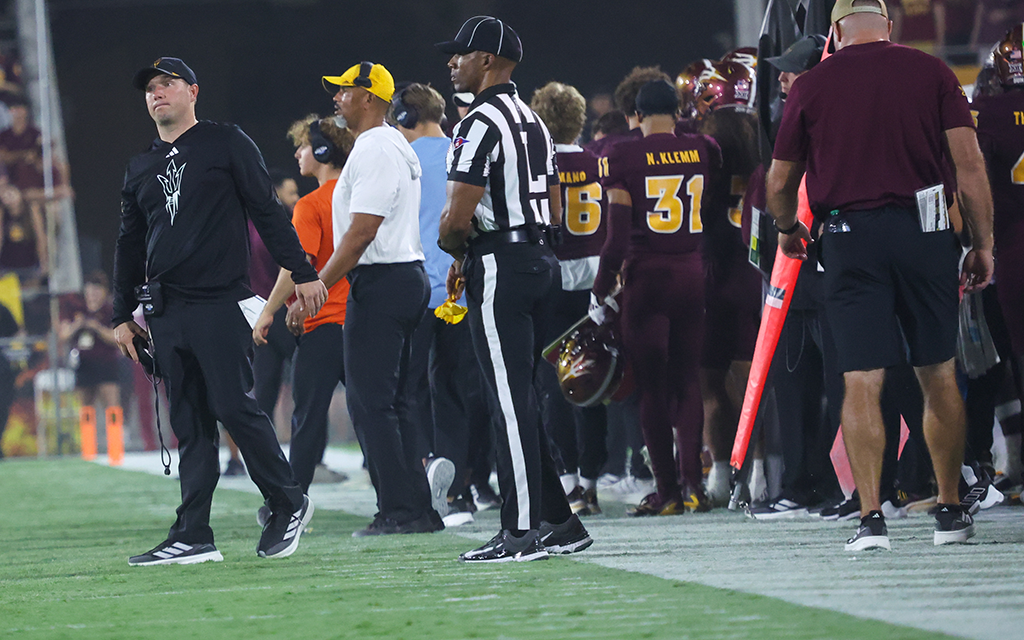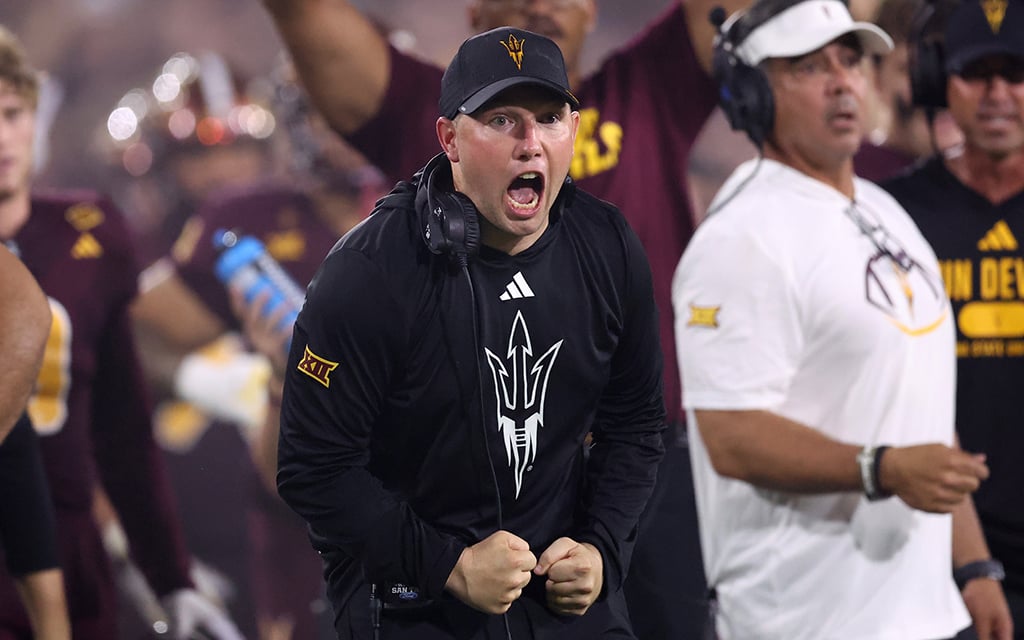
Arizona State coach Kenny Dillingham will test his team’s 4-1 start against the veteran leadership of Utah’s Kyle Whittingham Friday in Tempe. (Photo by Dylan Wickman/Cronkite News)
TEMPE – Other than their names ending in “ham” and guiding their teams to identical records through the first six weeks of the college football season, Arizona State coach Kenny Dillingham and Utah coach Kyle Whittingham share few similarities.
On Friday night at Mountain America Stadium, the two coaches will lead their 4-1 teams into battle against one another in a true test of youth against experience.
Whittingham, 64, has been with the Utes since 1994, becoming the head coach in 2004 after the University of Florida took a chance on an exciting new coach named Urban Meyer. Since then, Whittingham has amassed a record of 166-80, quietly becoming one of the nation’s best coaches.
Dillingham, 34, is essentially in his infancy as a head coach compared to Whittingham. Speaking Monday, he expressed nothing but respect for the veteran.
“It’s really incredible what he’s done there,” Dillingham said. “I hope in five to 10 years we can hopefully look and be like, ‘OK, we have sustained success or we have sustained a upward trajectory for similar reasons.’”
The respect for Utah’s program has spread to ASU’s locker room as well.
“They’ve been a good team for many years … that coach gets those guys to play with passion,” said senior running back Cam Skattebo, the reigning Big 12 Co-Offensive Player of the Week. “Everybody knows who they are.”
ASU’s hot start didn’t go unnoticed in Salt Lake City either.
“Impressed with a lot of things about their football team. They’re much more productive offensively this year than they were able to be last year,” Whittingham said. “We got our work cut out for us.”
Before Whittingham and the Utes throttled ASU 55-3 in Salt Lake City last season, Dillingham called Utah the “gold standard” of the Pac-12 before it dissolved. Despite a hiccup in Tucson against Arizona and an injury to veteran senior quarterback Cam Rising (who may return this week), the Utes have looked like the class of the Big 12 as well.
The two coaches have different philosophies from a football standpoint as well. Whittingham’s success at Utah can be largely attributed to producing elite defenses on a regular basis. While defense is not ignored by Dillingham, his background and credibility come from his ability to coach potent and explosive offenses. In his second year, he’s beginning to earn that reputation as a head coach rather than just a coordinator.
Dillingham and the Sun Devils sit at 39th in the nation for scoring offense, averaging 33.2 points per game, while Utah’s 28.4 has them at 71st. While Rising’s absence and games against tough defensive opponents have contributed to the Utes’ offensive numbers, their philosophy is still clearly different from the one being synthesized in Tempe.
The two coaches have contrasting backgrounds as well. Whittingham had a short career as a professional player in both the NFL and USFL. Dillingham took another route to take over the Sun Devils program, describing himself best.
“I’m a goofy little guy who didn’t play college football,” he said. “It may not be the model of what success looks like in college … and we can have success if the person steering the boat believes and is genuine.”
Dillingham quietly worked his way up the coaching ranks, starting at local Chaparral High School in Scottsdale as a quarterback coach and head coach while attending Arizona State. He latched onto current Florida State coach Mike Norvell when Norvell became offensive coordinator at ASU in 2014. Ten years later, Dillingham is coaching his alma mater after stops in the SEC, American Athletic Conference, ACC and Pac 12 in coordinator positions.
One thing that Dillingham hopes to apply to his program is continuity. No one in the nation has been better at that than Whittingham.
“I think one of the best things he’s done is he’s established a culture but then he’s retained staff,” Dillingham said. “When he retires, hopefully today, we can have a conversation about it and I’d love to pick his brain on what his secret was to retaining staff.”
Between assistant coach Jim Harding, offensive coordinator Andy Ludwig and defensive coordinator, and planned successor to Whittingham, Morgan Scalley, the Utes have a combined 34 years of coaching experience at Rice-Eccles Stadium.
“Right now, I think continuity wins in college football,” Dillingham said.
Last year’s extension of ASU defensive coordinator Brian Ward was a step in creating that continuity in Tempe, as well as making sure players like Skattebo returned to be leaders for the culture.
“I’m going to keep building this culture … we have to keep it rolling and get those younger guys following the right footsteps,” Skattebo said.
While nowhere near reproducing Whittingham’s success at Utah, Dillingham has already improved the program in just his second season at the helm with four wins.
He and the Sun Devils have a chance to see where he stands against one of college football’s most revered elder statesmen Friday at home.


